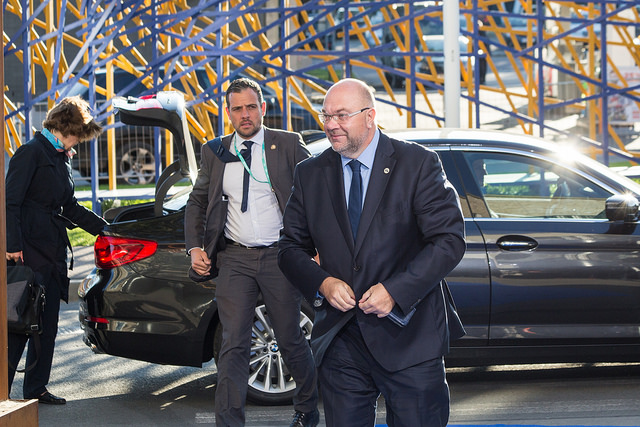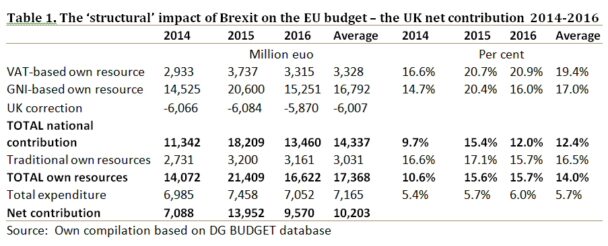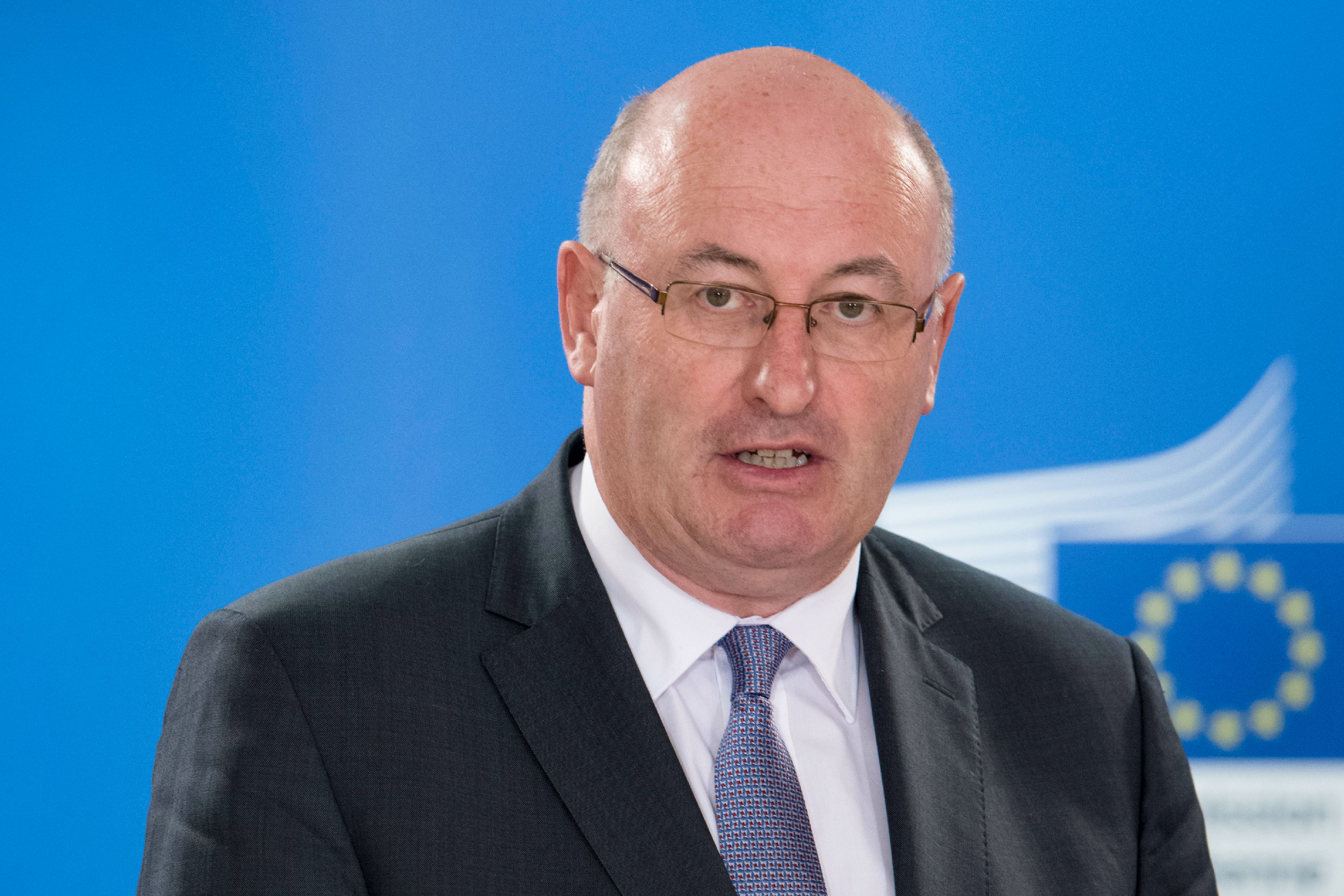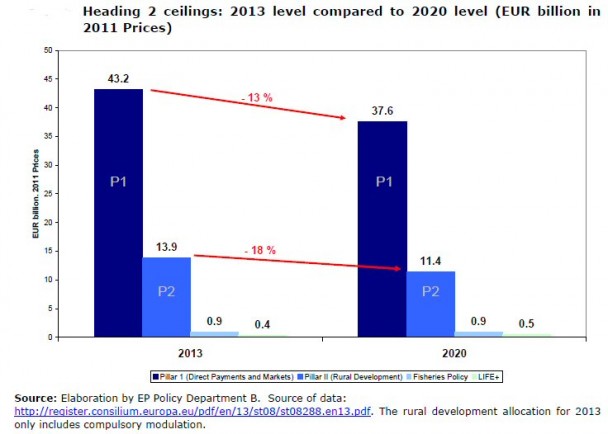As I discussed in this post, the Finnish Presidency has been tasked with presenting a first draft of the MFF ‘negotiating box’ with numbers prior to the next European Council meeting 12-13 December 2019. This will be no mean feat given the wide differences of opinion between the ‘frugal five’ Member States – Austria, Denmark, Germany, the Netherlands and Sweden – that want overall a smaller budget than what the Commission has proposed, and other Member States that want to reverse some of the Commission’s cuts in cohesion and agricultural spending (Politico’s Lily Bayer goes through the different alliances in this article published today).
The agricultural Ministers of seventeen Member States circulated a statement at the last AGRIFISH Council in October 2019 calling for the CAP budget to be maintained at its current level in nominal terms. Austria manages to be both a member of the ‘frugal five’ in the General Council while at the same time calling for increased CAP spending in the AGRIFISH Council, which suggests statements of agriculture ministers may be meant more for domestic consumption rather than reflecting the views of their governments.
On the other hand, Germany was not a signatory of the October 2019 paper although German and French agriculture ministers had called for exactly the same thing in a joint statement published in June 2018. Here at least there seems to be greater coordination between finance and agriculture ministries on the home front!
The October 2019 statement clarified that the position of those Member States seeking to reinstate the cuts in the CAP budget as compared to their earlier statement (the ‘Madrid’ statement) in May 2018 is the restoration of the nominal level of CAP spending. This is a more modest ambition than that of the European Parliament which, in its resolution on the MFF of 10 October 2019 (the first time the Parliament newly-elected in May 2019 has expressed a view on this issue) reiterated the position of the previous Parliament that the agricultural budget should be maintained in real terms.
Neither the Member States’ statements nor the European Parliament position refers explicitly to the division of CAP funding between the two Pillars. The most puzzling aspect of the proposed CAP budget in the Commission’s 2021-2027 MFF proposal was not the small overall nominal cut of 3-5% (depending on how the calculation is done) compared to the current period – after all, the Commission’s Reflections Paper published in June 2017 had simulated a number of scenarios including up to a 30% reduction in the CAP budget.
The most puzzling aspect was rather the way the Commission opted to distribute the overall reduction in the CAP budget between Pillar 1 (a small nominal increase of between 0.5% and 2%) and a severe reduction in the Pillar 2 budget (of between 17-19%, again depending on the method of calculation, see the detailed figures in this European Parliament Policy Department briefing for the AGRI Committee).
This reversed the trend in the last three MFF’s to increase the share of Pillar 2 in the overall CAP budget. It also went further than an equi-proportionate cut in both Pillars that might have been seen as the least controversial way of presenting the reduction.
In this post, I put forward some potential explanations for the Commission decision. I should emphasise that these are not based on interviews or inside information on the Commission’s decision-making process but are rather speculations from an outside observer. Hopefully, they might inform some of the questions that political scientists or historians might put to the key players when the time comes.
Rationale for deeper cuts in Pillar 2 spending in the next MFF
Prioritisation of income support
The most obvious explanation is to take at face value the rationale given by Commissioner Hogan immediately after the Commission’s MFF figures were published. In a Facebook post, Commissioner Hogan defended the Commission proposal as follows:
Travelling throughout Europe in recent months, I have heard a strong and consistent message from farmers and farm leaders, as well as rural community leaders and politicians, emphasising the vital importance of direct payments as essential income support. I have listened very carefully to these messages and have therefore decided to prioritise the protection of direct payments in the new budget. As a result, direct payments will not fall by more than 4 per cent in any Member State.
Thus, the first and simplest explanation is that the Commissioner has chosen income support as a more important objective of the CAP than addressing environmental and climate challenges. The Commission has, it is true, proposed a more targeted income support (though hardly with much conviction). Member States are also required under its proposal to integrate the greening requirements into enhanced conditionality and to use at least some of the Pillar 1 direct payments for eco-schemes designed to address environmental and climate challenges. Nonetheless, the choice sits oddly with many of the other statements made by the outgoing Commissioner regarding the importance of raising the level of environmental and climate ambition in the next CAP.
A political economy argument
The Commissioner’s decision may have been influenced by the lessons learned from the successful CAP reform of former Commissioner Franz Fischler in his Mid-Term Review of the CAP in 2003 which ushered in decoupling. Decoupling was a major change in the design of direct payments, and one for which there was little prior demand among Member States (the Parliament at that time had only a consultative role in CAP policy-making).
Fischler’s reform strategy was built on a complete separation of the redesign of CAP payments from any distributional consequences either between Member States or among farmers. Member States and farmers got exactly the same payments as they did previously (apart from a limited reduction in payments (‘modulation’) for larger farms to be used to strengthen rural development policy); these payments were now no longer linked to production as before.
Fischler’s reform left us with the legacy of grossly unequal payments per hectare both between countries and among farmers within countries. The continuing debates over external and internal convergence testify to the challenges in removing these disparities. It is clear that, if Fischler had attempted both to introduce decoupling of direct payments and to redistribute payments more uniformly, his reform would have stopped in its tracks.
Hogan may have reasoned similarly. The big innovation in his CAP reform proposal is the new delivery model which is intended to transform the governance of the CAP from a compliance-based to a results-based policy. Although put forward as a step towards simplification of the CAP, Member States have given the proposal an ambiguous welcome. They fear that strategic planning and performance monitoring could increase the burdens on public administrations and lead to greater uncertainty around the delivery of payments to farmers.
These fears are felt most strongly around Pillar 1 payments, given that Pillar 2 payments are already governed by a programming logic and build around targets and result indicators. Hogan may have reasoned that, if Member States were at the same time asked to accept a cut in Pillar 1 payments, opposition to his new delivery model would have been stronger. Pragmatically, therefore, like Fischler, he may have concluded that his best chance of getting the new governance model accepted was to rock the boat as little as possible on the size of Pillar 1 direct payments.
Greater flexibility to top up Pillar 2 resources from national funds
Another argument for making cuts in Pillar 2 rather than Pillar 1 payments is that Pillar 2 payments require national co-financing. This favours cuts in Pillar 2 for two reasons. For the same overall CAP budget, a cut in Pillar 2 reduces the financial cost to Member States of drawing down CAP funds, which is always welcomed. On the other hand, if the objective is to maintain overall transfers to farmers from both EU and national sources, Member States are able to add to Pillar 2 resources from national funding whereas this is not possible for Pillar 1 direct payments.
The Commission in its proposal makes use of this latter lever by proposing an increase in national co-financing rates for Pillar 2 spending by 10 percentage points. Commissioner Hogan, in his Facebook post, optimistically claimed that this additional national co-financing would “allow public support to rural development to remain largely unchanged”. It would go a long way to closing the gap but would not eliminate it completely, as the following calculation shows.
The EU contribution to rural development spending in the EU27 in 2014-2020 was €97.7 billion in current prices (measured using the Commission’s preferred approach of taking the 2020 commitments and multiplying by seven) and €95.6 billion if the commitments are summed over the seven-year period. The Commission proposes to reduce this contribution over the period 2021-2027 MFF to €78.8 billion in current prices.
In the 2014-2020 programming period, €95.6 billion in EU funding prior to transfers attracted around €50.9 billion in national co-financing, for a total spend on rural development (excluding top-ups and transfers between Pillars) of €146.5 billion (the national funding includes the UK so this total is slightly exaggerated). The EU contribution averages 65% and the national co-financing rate averages 35%. Changing these ratios to 55:45 by shifting 10 percentage points from the EU to national co-financing and applying these ratios to the proposed lower EU Pillar 2 spending increases the national co-financing contribution by €13.6 billion to €64.5 billion. Overall spending on rural development (excluding top-ups and transfers between Pillars) would then reach €143.3 billion.
Thus, there would still be a slight fall in rural development spending in nominal terms (before transfers and top-ups) of around €3.2 billion even with the proposed increased rate of national co-financing but less than the reduction in the EU’s contribution alone of €16.8 billion.
Equally important as the possibility to offset some of the reduction in the EU Pillar 2 budget through an increased compulsory rate of national co-financing is the possibility for Member States to voluntarily increase their spending on rural development programmes (RDPs) in the form of top-ups, a possibility that does not exist in the case of Pillar 1 direct income support payments.
To comply with State aid requirements, Member States have to include this RD-like expenditure in their Rural Development Programmes. It is then signed off as part of the approval process of national and regional RDPs by the Commission. In the 2014-2020 period, a total of €10.7 billion in national top-ups are included in Member State RDPs.
It would be open to any Member State to make similar additional national contributions in the coming programming period. The objection is made that Member States do not have an equal capacity to make these voluntary contributions.
The fungibility of resources between the two Pillars
A third factor behind the Commission’s thinking may have been that its CAP proposal increasingly blurs the distinction between the Pillars. Expenditure in both Pillars must now be programmed and measured against results. There is increased flexibility to transfer funds between Pillars, as well as the ability to fund similar measures from either Pillar (for example, eco-schemes can fund farmers who undertake commitments to observe agricultural practices beneficial for the climate and the environment just as agri-environment-climate measures do in Pillar 2).
From this perspective, the precise division of a country’s total CAP receipts between the two Pillars is now a much less significant constraint on how a country allocates its national envelopes between income support, on the one hand, and environmental and climate action, on the other hand. I am not evaluating in this blog post whether this flexibility makes sense if we want to encourage a higher level of environmental and climate ambition. I am instead trying to understand the Commission’s thinking when it put all of the nominal cut in the CAP budget on Pillar 2 and nothing on Pillar 1.
Knowing that Member States can shift resources between Pillars and that some Pillar 2-type measures can now be funded from Pillar 1 makes the Pillar allocations much less predictive of how Member States will spend their CAP monies than in the past.
There is one vital way in which differential cuts between the Pillars still have a major significance. Member States differ greatly in the composition of their CAP receipts between Pillar 1 and Pillar 2 payments. Differential cuts in the two Pillars imply, therefore, asymmetric impacts on individual Member States. This aspect of the Commission’s MFF proposal has been widely overlooked. We explore its implications in the following section.
Rebalancing the consequences of external convergence
The demand for external convergence has been, along with liberalisation of the rules governing voluntary coupled support, the principal negotiating objective for some of the newer Member States in this round of CAP reform, notably the Baltic States but also some other central European countries. In a joint declaration on the CAP post 2020 in June 2017 by Ministers for Agriculture of the Visegrad Group (Poland, Hungary, Czech Republic and Slovakia) together with Bulgaria, Romania and Slovenia, a subset of these countries with unit payments per hectare below the EU average (Bulgaria, Poland, Romania and Slovakia) insisted on the importance of continuing the process of levelling unit payments per hectare among Member States. They have continued to emphasise this objective at successive AGRIFISH Council meetings and in further Visegrad Group interventions.
It is important to recall the rationale for the national envelopes that were included in the accession agreements of the newer Member States. For direct payments, the amounts were based on the level then pertaining in the EU15 but applied to base areas, reference yields and ceilings for livestock that were individually negotiated with each accession country. Because of lower yields and lower volumes of production, the outcome was that by the end of the ten-year phasing-in period when payments were intended to be ‘at the same level’ in both older and newer Member States, payments per hectare in the newer Member States averaged about 70% of those in the older Member States (University of Bologna, 2007).
This was not necessarily an unwanted outcome. There was an obvious concern among the older Member States to keep the enlargement ‘bill’ as low as possible. But there was also a feeling that the enormous inflow of CAP direct payments could slow down necessary structural change. It would make more sense to provide CAP transfers to the newer Member States through Pillar 2 rather than through Pillar 1 in order to assist in the necessary restructuring.
The resulting compromise was that the newer Member States got lower amounts through CAP Pillar 1 but larger amounts through CAP Pillar 2. The countries now pressing for increased Pillar 1 payments through raising their direct payments per hectare to the EU average fail to recognise this implicit relationship between the funding they receive through the two Pillars.
The following graph shows the relative shares of CAP transfers received through the two Pillars in the 2015-2020 period (the Pillar 1 shares only show pre-allocated receipts under the direct payments envelope, market-related expenditure allocated for sectoral programmes such as wine, olive oil, etc as well as non-pre-allocated spending such as school schemes and promotion are not included). The differences in the shares between countries is very striking.

Countries such as Denmark and the United Kingdom receive only 9% of their pre-allocated CAP transfers through Pillar 2, while for countries like Portugal, Croatia and Malta, the shares are over 50%. The newer Member States are all located to the right-hand side of the graph but there are also some older Member States (notably Austria and Finland as well as Portugal) that are disproportionately dependent on Pillar 2 transfers.
These differences in dependence on the two Pillars for transfers become highly significant when the Commission’s draft MFF regulation proposes to make all of the reduction in the CAP budget in nominal terms in Pillar 2. This proposal has very asymmetrical implications for different Member States, depending on their relative share of Pillar 2 receipts in total CAP transfers. This is shown in the following table, which presents the percentage changes in each Member State’s receipts under the two Pillars and the CAP as a whole in 2021-2027, compared to their receipts in the 2014-2020 period.

The first column shows the changes in direct payments envelopes. For the EU27 the average reduction is 1.9% but the figures for individual Member States vary between +7.4% for Estonia, +7.1% for Latvia and +6.5% for Lithuania to -3.9% for many of the other Member States as a direct result of the Commission’s external convergence proposal in the MFF. The increase for Croatia is even higher at +22.1% but this reflects the final phasing-in of its direct payments after accession.
The average reduction in rural development envelopes is much greater at 15.3%. The Commission has proposed to make this cut across-the-board. Overall, there is a cut in pre-allocated transfers (excluding market-related expenditure) of 5.3% for the EU as a whole.
The third column shows the combined impact of both proposals (external convergence in Pillar 1, and the larger nominal cut in Pillar 2 payments) on overall CAP receipts (again, we note market-related expenditure is not included). For Malta, the overall outcome will be a cut of 12.1%, for Slovenia a cut of 9.3% and for Austria a cut of 9.0%.
The results for the Baltic countries are especially noteworthy, as these are the countries that benefit the most from the external convergence ‘uplift’ in the first column. Because of their large dependence on Pillar 2 transfers, the overall receipts of Estonia and Lithuania will fall under the Commission’s proposal in the coming period, while Latvia will just about hold on to its current level.
The extent to which the larger proposed reduction in Pillar 2 payments rebalances external convergence is shown in the final column by subtracting the proposed percentage change in direct payment envelopes from the overall percentage change in CAP receipts. I have ranked the table by this column to highlight those countries most affected in the upper half of the table.
Croatia is by far the most affected. Its expected gain of 22% in its direct payments envelope due to the final phasing-in these payments is almost nullified by the reduction in its Pillar 2 receipts. It is also clear that those Member States that have been most vocal in calling for further progress towards external convergence also find their gains reduced by the larger cut to Pillar 2.
The question I am raising is whether this is simply an accidental outcome of the way the Commission chose to allocate the cut in the CAP budget between the Pillars? Or does it represent a more conscious decision to revisit the compromise agreed with the newer Member States at the time of their accession? It was thus no surprise to see the Member States most adversely affected by this differential cut with Slovenia in the lead come out with a statement in January 2019 extolling the virtues of rural development spending, without however mentioning explicitly their specific financial interest in avoiding a differential cut.
Conclusions
Perhaps the most puzzling, because unexpected, part of the Commission’s budget proposal for the CAP post 2020 was not the nominal reduction in the budget in itself (which had been predicted if not welcomed) but rather the fact that the Commission chose to impose all of the cut on Pillar 2 funding while maintaining the level of Pillar 1 funding. In this post, I explore some potential rationales for the Commission’s decision.
The most obvious and simplest explanation is Commissioner Hogan’s own account that the feedback from farm unions and politicians emphasised the vital importance of direct payments as essential income support and that he therefore decided to prioritise the protection of direct payments. While a plausible acknowledgement that it is farm unions that set EU farm policy, it contrasts with other positions he has taken underlining the importance of greater emphasis on environmental and climate goals. It makes one wonder if there were not other factors in play.
In this post, I suggest a number of other possible factors that may have played a role in this decision. Even if this were not the case, the discussion highlights some of the implications and consequences of the Commission’s approach.
- A pragmatic decision to minimise expected opposition to the new delivery model (which has most implications for Pillar 1 payments) by avoiding at the same time cuts to the Pillar 1 budget.
- The fact that Member States can make additional contributions to Pillar 2, either through an increase in co-financing rates or through voluntary top-ups, which is not the case for Pillar 1. The counter-argument here is not all Member States have an equal capacity to make such additional payments.
- The greater ability given to Member States to move resources between Pillars and to finance similar agri-environment-climate measures using Pillar 1 funds to those that can be funded from Pillar 2 means that the practical significance of the division between two Pillars will become increasingly blurred. While this assessment is broadly correct, it ignores a vital distinction between the two Pillars, namely, that the relative importance of transfers under the two Pillars is strikingly different across Member States.
- This last point gives rise to a final potential rationale for the Commission’s decision, namely, that it is intended to rebalance the consequences of external convergence on the net transfers among Member States in the light of the implicit bargain struck at the time of the last accessions. This implicit bargain was that lower direct payments ceilings would be compensated by higher rural development ceilings. External convergence now disturbs this balance. If some newer Member States insist on getting a larger share of the direct payments pie, their case for preferential treatment with respect to rural development funding is weakened. Whether this rationale motivated the Commission’s budget proposal or not, it has this undoubted effect. It is, however, a relatively crude rebalancing instrument, with some older Member States (Portugal, Austria and Finland) also negatively affected.
The outgoing Budget Commissioner Gunther Oettinger has lambasted critics of the Commission budget proposal for focusing too much on net balances, particularly when a growing share of the budget is spent on EU programmes that provide general benefits rather than specific transfers to Member States.
However, CAP spending remains primarily a redistributive policy and net balances remain all-important. The fact that Austria and Finland are not only expected to pay relatively more into the EU budget (due to the elimination of budget rebates proposed by the Commission) but are also likely to lose relatively more in terms of receipts because of the stronger reduction in the CAP Pillar 2 budget may only confirm their hard-line position on the EU MFF ceilings as members of the ‘frugal five’.
Spare a thought for Charles Michel who assumes office as President of the European Council on 1 December next and who will have the job of coming up with an MFF proposal that will satisfy all 27 Member States.
This post was written by Alan Matthews
Update 6 Nov 2019: The calculation of the change in total rural development spending has been changed to use the figure of €95.6 billion as the base for deriving the existing average national co-financing ratio rather than the figure of €97.7 billion that I had used initially. A reference to the modulation of payments in the Fischler reform was also added.
Photo credit: CosmoShiva at pixabay.com licensed for re-use





















